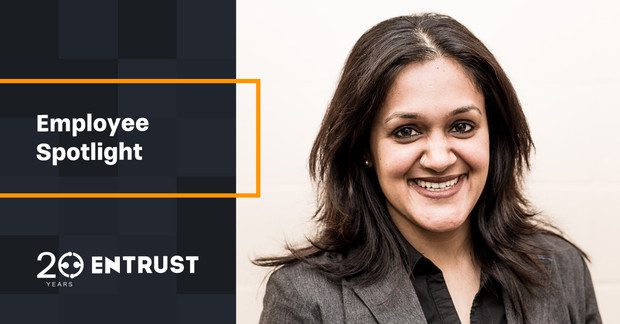Employee Spotlight: Roopa Belur – Behaviour Specialist

Apr 03, 2017
To continue our celebration of Entrust's 20th Anniversary, we decided to sit down with Roopa Belur, one of our Behaviour Specialists, to talk about the work we do to help people with developmental disabilities.
What drew you down the path of working with people with developmental disabilities?
When I was a young girl, I volunteered reading to people at a school for the visually impaired and for people with various personality disorders or disabilities. Later, I started my post-secondary education in India working towards a Bachelor's degree in Science. I have a sister who was in her undergrad working towards a Psychology degree at the same time as me, and I kept finding myself drawn to her textbooks rather than my own. So I think it was the combination of volunteering in my youth and being exposed to my sister's studies that ended up showing me where I was meant to be.
Why is it beneficial to have a behavioural specialist working in an organization like this?
Having a behaviour specialist in-house, rather than contracted out, is great because you build a strong rapport with the client's family and they feel comfortable enough to just pick up the phone and call you whenever they need to. The connection to the clients themselves and the quality of the service we provide is so enhanced by having someone always available in-house, and I think this unique offering makes Entrust really stand apart.
Can you tell us a bit about how behavioural plans are developed?
A big chunk of our clients are in the Autism Spectrum, and as they age, their needs change, so plans need to be updated quite often. Behaviour plans include what a normal day for the client looks like, their triggers, how to tell when they are upset, proactive strategies to prevent upsetting situations from occurring, active strategies to minimize stressful events, and a crisis plan. To make the plan, the entire team that works with the client comes out to the office. I listen to the voice of the staff, and with it, I make the plan.
How do you see the Meaningful Employment program helping clients?
The program really makes our clients happier - it is most often the lack of activity that causes behaviour problems, and employment allows them to feel very confident and secure. It isn't a fit for everyone, but when it is, it makes a huge difference. It gives them a sense of pride that their work is important, and it ends up adding a strong sense of confidence and meaning to their lives.
The nice thing about the Meaningful Employment program is that it is very tailored to the needs of the individual. We are not asking the client to change and adapt to their environment, but we are instead adapting the work environment to suit them. We understand that we can't ever fix the disability or the behaviour, but we can fix what is causing it and alter the environment so we can help the client.
What is the one thing everyone should know about Entrust?
There are a lot of cookie-cutter practices with other service providers, and where Entrust really stands apart is how we individualize our approach. We capitalize on the interests and the positives of our clients, as opposed to constantly working on things they simply cannot do. Instead of trying to change our clients, we focus on their environment and make modifications in ourselves, as staff, to ensure they have meaningful lives.
Where the world often views a disability as something correctable, at Entrust we embrace it as a welcome part of the individual.
After obtaining a Bachelor's degree in Sociology, Economics, Psychology and a Masters of Science in Psychology from India, Roopa moved to Birmingham, Alabama. She worked as an assistant psychologist focusing on psychological testing, diagnosis, life skills training and behavior management plans for people in the Autism Spectrum. Since March of 2015, Roopa has worked alongside other behavioral specialists at Entrust to develop behavioral plans for each of our clients.
